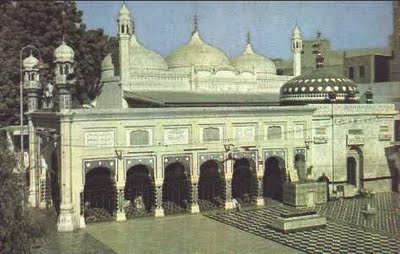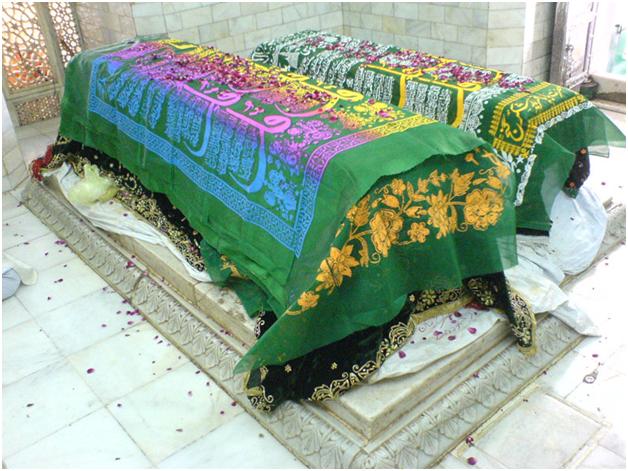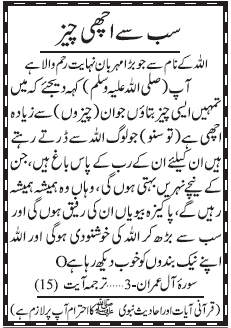Hazrat Baba Fareed-ud-Din Masood Ganj-e-Shakar (ra)

Dar-e-Janat hai darwaza Farid Uddin Chishti Ka.
(The door of Farid Uddin Chishti is the door of heaven)
Hazrat Baba Faridudeen Gang Shakar (rahmatullahi alaihi) was one of the most influential and pivotal figures in the Chishtiyya silsila, and is widely renowned for his intensely rigorous mujahedas in Allah's path. After the premature death of Khwaja Qutubuddin Kaki (rahmatullahi alaihi), only a year after the demise of Khwaja Moinudeen Chishti (rahmatullahi alaihi), the bulk of the work begun by the latter fell upon his shoulders. It was he who, in his 37 years as head of the silsila, ensured the propagation of Islam throughout India and the lands beyond.
Khwaja Farid al-Din Masaud-Ganj-i Shakkar ('Treasure of Sugar') as he came to be known-was born in Kahtwal, in the district of Multan (present-day southeast Pakistan). His grandfather Qazi Shuoayb, a jurist from the house of Farrukh Shah 'the Just' (whose lineage is traced through Sulan Ibrahim ibn Adham to 'Umar al-Faruq), had left his native Kabul after it was swallowed up by the Ghaznavid Empire. Miraculous events surrounded Baba Faridudeen's (rahmatullahi alaihi) birth. He was born on the 29th Shabaan in 569 AH, the son of a pious alim and a waliah (female saint). As the night was cloudy, people did not know whether Ramadaan had begun or not. But a dervish told them that a wali had been born who would be the Qutb (spiritual monarch) of his ! time, and that they must look to the child for their answer. Sure enough, the one-day old Baba Faridudeen (rahmatullahi alaihi) did not touch his mother's milk after sehri, indicating to all that Ramadaan had in fact begun. Baba Faridudeen (rahmatullahi alaihi) was a direct descendent of Hazrat Umar Farooq (rahmatullahi alaihi). After completing his education in Kahtwal, for higher studies Farid al-Din proceeded to the city of Multan, which was then an important center of Islamic learning. In Multan Farid al-Din lodged at a mosque, where he busied himself with books. One day as he was reading Khwaja Qutb-ud-Din Bakhtiyar Kaki appeared in the mosque. Farid al-Din recognized at once that this was no ordinary man. As Khwaja Qutb al-Din prayed his namaz, Farid al-Din meekly seated himself nearby. When the Khwaja was finish ed, he addressed him: 'Masud, what are you reading?' Farid al-Din answered, 'I am reading Nafi' (a legal text, the title of which means 'useful').' 'And do you find it useful?' Farid al-Din confessed,"What is useful to me is the alchemy of your glance." Overcome with emotion, he kissed Khwaja Qub al-Din's feet.

After his education finished, Baba Faridudeen (rahmatullahi alaihi) was ordered by his Pir-o-murshid to begin a tour of al l the Islamic countries in order to meet the leading mystics of his time. On this journey, he came into contact with many great sufis. Whilst in Madinah performing Hajj, he was spiritually directed by the Holy Prophet (saw) to go to Baghdad. Doing so, he was welcomed by the son of Hazrat Shaykh Abdul Qadir Jilani (rahmatullahi alaihi) and given khilafah in the Qadriyya silsila, as well as receiving from him various sacred relics such as a turban and wooden food bowl of Rasulallah (sallalahu alaihi wasallam). After eighteen years of travelling, he returned to Delhi and his Pir-o-murshid, and was given khilafah by Khwaja Qutbudeen Kaki (rahmatullahi alaihi) in the presence of many great sufis. Baba Faridudeen (rahmatullahi alaihi) was then ordered to go to Hansi and begin preaching Islam there. But before he had even settled down, he received the sad news of Khwaja Qutbudeen Kaki (rahmatullahi alaihi)'s death, and rushed back to Delhi arriving, as Khwaja Qutbudeen Kaki (rahmatullahi alaihi) had prophesied, three days after his death. There he was given the khilafa-e-azam of Khwaja Qutbudeen Kaki (rahmatullahi alaihi) and decided, because of the political upheavals occuring in Dehli, to move the Chishtiyya headquarters to Ajodhan, the city renamed Pak Pattan in honour of him. Ajodhan was a small, isolated town surrounded by jungles and wild animals, but with the spiritual blessings of Baba Faridudeen (rahmatullahi alaihi), it soon became a bustling centre of Islam. Scholars and sufis flocked from all over India and the lands around to study under the great wali, who built up a veritable university of Islamic education along with a great khanqah. From Ajodhan wou! ld leave many missionaries who spread out over the whole of India to propagate Islam and Sufism. His great popularity aroused the ire and jealousy of Ajodhan's qadhi, who out of his envy wrote a letter to the leading ulema of the time complaining about Baba Faridudeen's (rahmatullahi alaihi) love of Sama. But the ulema rebuffed him, saying, 'Baba Farid is the Qutb of our time, and the highest authority on Shariah among all of us. If he says Sama is permissible, then it is.' The above incident bears ample testimony to the universal awe in which Hazrat Baba Faridudeen (rahmatullahi alaihi) was held. His mujahedas were of such rigour that few in the history of sufism have managed to surpass them. Once he was ordered by Khwaja Qutbudeen Kaki (rahmatullahi alaihi) to perform a forty night seclusion whilst suspended upside down in a well, being pulled up only for salaah and to perform more ordinary devotions. As an initiate Farid al-Din followed the example of his murshid in fasting continuously and practicing the most rigorous spiritual disciplines undertaking even the daunting chilla makus ('inverted retreat'): forty nights of zikr ('remembrance,' invocation) while suspended ups! ide-down in a well. One day when Khwaja Muoin al-Din Chishti, Khwaja Qub al-Din Bakhtiyar Kaki, and Farid al-Din were sitting together, Khwaja Muoin al-Din said to Khwaja Qub al-Din: 'How long will you scorch this youth with spiritual exertions? Show him some kindness.' Khwaja Qub al-Din assented, and both Shaykhs rose and together gave Farid al-Din the blessing of a glance of kindness.
Baba Faridudeen (rahmatullahi alaihi)'s kindness and forbearance were legendary. Once a soldier came with the intention of killing him, but the great saint merely told him, 'Dear brother, I have done you no harm. Why would you kill a dervish and earn the curse of God?' When the man relented, he immediately embraced and forgave him. He was the most humble of men; despite all the vast knowledge he had at his disposal, he would refrain from even correcting those who came to him arrogantly for fear of puncturing their egos. Baba Faridudeen (rahmatullahi alaihi) enjoined the strict adherence to Shari'ah and the necessity of renouncing the pleasures of the world as pre-requisites for embarking on the journey towards Allah. His love for the Prophet (sallalahu alaihi wasallam) was so intense that he would sometimes break down and cry whilst lecturing on him, realising his own worthlessness as compared to that of our beloved Prophet (sallalahu alaihi wasallam). As with all the gre! at sufis, the object of his life was devotion to Allah and service of mankind. His miracles or karamaat are too numerous to mention, but the greatest stretched over years before they came to fulfilment. One of his descendants, Hazrat Ibrahim Farid Saani (rahmatullahi alaihi), was visited and held in awe by Guru Nanak, founder of the Sikh religion. After completing his training and receiving the honor of khilafat, Khwaja Farid al-Din asked his master's permission to withdraw to the cantonment town of Hansi, where he hoped to maintain a low profile. With tears in his eyes, Khwaja Qub al-Din said, 'Mawlana Farid al-Din, I know you will go. Go. It is destined that you will not be present at the time of my death.' Bidding those in attendance to recite Sura Fatia and Sura Ikhlas, he conferred on him his prayer carpet and staff, and uttered his final testament, 'My place is yours.' In Hansi one night Khwaja Farid al-Din saw his master in a dream, beckoning him. In the morning he left for Delhi. On the road he learned that Khwaja Qub al-Din had passed away that very night. On his arrival in Delhi Qazi amid al-Din Nagawri presented him with the remaining mystical insignia (tabarrukat) of Khwaja Qub al-Dina robe, turban, and pair of wooden sandals.and Khwaja Farid al-Din took his seat in his master's house.
Hazrat Baba Faridudeen (rahmatullahi alaihi) left 14 khulafa behind him, principal of whom were Hazrat Sabir Paak (rahmatullahi alaihi), the founder of the Sabriyya silsila and Hazrat Nizamudeen Auliya Mehboobe Elahi (rahmatullahi alaihi), founder of the Nizamiyya order. Hazrat Nizamudeen (rahmatullahi alaihi) was his principal khilafa, and was located in Dehli. Under him, the Chishtiyya silsila achieved the zenith of its glory and influence. He collected the gathered teachings of his master as Baba Farid had collected those of his murshid Khwaja Qutbudeen Kaki (rahmatullahi alaihi). Like his predecessors, Khwaja Farid al-Din wrote no books, but a number of his sayings were recorded by his disciples and incorporated in Siyar al-awliya'. These are among them: God feels shame in denying the request of a worshipper whose hands are raised in supplication.
Aphorisms
If you have something, there is no reason to be sad. If not, there is still no reason to be sad.
For a 'true man', a day of contentment is like the night of the Prophet's Ascension (miraj).
One should not be dissuaded from one's work by the hotness or coldness of others.
The Sufi is one who elucidates everything and is roiled by nothing.
When a dervish dons new clothes it should be known that he dons his shroud.
The prophets are alive even in their graves.
A single experience of divine attraction (jazba) is better than the combined piety of both worlds.
We are content with our portion: for us, knowledge; for the ignorant, wealth.
Disaster comes with contrivance; peace comes with submission to the Divine will.
A faqir ('poor one') among the 'ulama' (religious scholars) is like the full moon among the stars.
Death comes to all, even the greatest of saints, but the manner in which we receive it is not the same for all. As Baba Faridudeen (rahmatullahi alaihi) was born in a state of devotion, so too he died in that state. Khwaja Farid al-Din would often lie in prayerful prostration (sijda) for hours on end, reciting, 'I die for You; I live for You.' Having reached his ninety-third year, on the evening of 5 Muarram 664/1265 the Shaykh breathed his last. As he expired he uttered, 'Ya ayy, Ya Qayyum' (O Living, O Eternal). Khwaja Farid al-Din's tomb in Pak Pattan, originally built with unbaked bricks pried from his hut, is today a major pilgrimage center, attracting tens of thousands of devotees each year.
His last words were, 'Ya Hayyo ya Qayyum.' Upon his death, a divine voice was heard by those gathered to say,'FRIEND HAS MERGED INTO THE UNITY OF FRIEND.'





 This is a free homepage created with page4. Get your own on www.page4.com
This is a free homepage created with page4. Get your own on www.page4.com